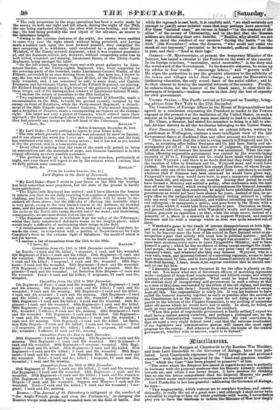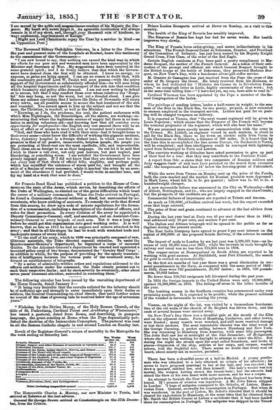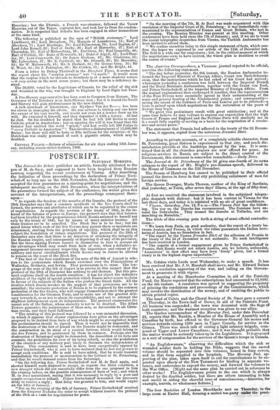Yilisttllaututo.
Letters from the Marquis of Clanriearde to the Russian-War Minister, -and from Lord Dunkelliu to the Governor of Kaluga, have been pub- lished. Lord Clauricarde expresses the "lively gratitude and profound -emotion" with -which he is inspired by the "kind and gracious recollec- tion" which the Calir " hawbeen pleased.to preserve" of him. "The order whith the Emperor has issued in regard-to my son is perfectly in-harmony withithe personal goodness-that his Majesty formerly exhibited -towards me, and which I can never forget. I have motives for thinking -that-no one can bettor scomprehend than his Imperial Majesty the public duties which under unfortunate circumstances are required of us."
Lord Dunkellin is not leas grateful: addressing the Governor of -lialuga,
he says—
"this magnanimity, whith restores tee to complete freedom i and uncon-
ditionally, really the act of-a great man ; and although I shall never heist a situation to expreas -to him my whole gratitude with words, I nevertheless pray you to have -the kindness to inform the 'Minister of -War how deeply I am moved by the noble anti niegnanimoas conduct of his Majesty the Em- .peror. My heart will never forgetit. An agreeable recollection will always remain in it of my short, and, through,your thousand acts of kindness, no waysunpleasant, Imprisonment at Beluga."
Might not Lord Clanricarde repay the Czar by a service in lind—as ) an Opposition Peer.] The Reverend 'Sidney .Godolphin Osborne, in a letter to the Times on the past and present state of the hospitals at Scutari, bears this testimony to the earnestness of the Government-
" I am now bound to say, that nothing can exceed the kind way in which my efforts for our poor sick and wounded men have been appreciated by the Minister and 'Secretary of War. My suggestions have been received in the same grateful spirit ; and I do firmly believe that that which the Govern- ment have desired from the first will be obtained. I know no energy, no expense or pains are being spared. I can see no reason to doubt that, with the machinery and staff Lord W. Paulet will soon possess—with the active support of the Government so substantially afforded him—he will soon bring all the hospital departments and the transport of the sick into that condition which humanity and policy alike demand. I am not now writing to defend or to accuse, but thati may comfort those over whose relatives the 'Hospi- tal ' fate may hang, as not the worst, but vet a dreaded cloud. I can give them my solemn conviction that I believe the Duke of Newcastle will strain every nerve, use all possible means to secure the best treatment of the sick and wounded. You cannot speak to him on the subject and not see that the man, the Christian, is touched, as well as the Minister.
"Knowing as I do, the prudence, the zeal, the patient endurance with which Miss Nightingale, the Bracebridges, all the sisters are working—re- membering that where the legitimate sources of supply fail there is no hesi- tation in seeking voluntary aid—and knowing how that aid watches every opportunity for employment—the English may rest assured there will be no want of effort or of means to meet the sick or wounded men's necessities.
"God, and those who have read it with their eyes—had it brought home to their every sense—alone know the difficulty of working this gigantic accident, fever, dysentery hospital in a foreign distant land, in which your first im- pression is that of all passive, immoveable, helpless -people, the people you are protecting at blood-cost are the most apathetic' idle, and impracticable. Their ideas are as foreign to us as their language. Do not let it be said that 'wish to throw a veil over, not only past horrors, but past neglect, past blundering, or something worse. I am satisfied the Government have been grossly imposed upon. If I did not know that they are determined to trace out every link of that chain of official folly, stupidity, and perhaps guilt, which has .mystified the existence of -stores -paid for, and brought all the evils of a famine of every necessary, whileitmocked the crisis by an aver- ment of the abundance it had provided, I would write in another tone, and try my band ala work that must be done."
Sir Francis Bond Head has published a petition to the House of Com- mons on the state oPthe Army, which serves, by describing the efforts of the Duke of Wellington, to remind us of the great difficulties which beset the career of a military commander. When-the Duke arrived in Portugal, he found a Commissary-General without a Staff, but surrounded ty-ac- eountanta, -Who knew.nothing of accounts. No remedy the evils that flowed from this source, he drew up a code of minute regulations for the forma- tion of a commissariatvincluding a description of the duties of officers, and rules for their promotion. In-every division of the army he appointed a Deputy Commissary-General, staff, and assistants, and an Assistant-Corn- miasary-General to every brigade of each arm. But it was a long time before he could getthis organisation into good working order. It is well known, that as late as 1812 he had no sappers and miners attached.to his army; and that in his sieges he ladle work .with wretched tools and inadequate means of every kind.
"To the staff of his army, which-in 1808 was principally composed of raw, illiterate materials, the Duke directed especial attention. To assist the QuartermasterAleneral's department, he 'organized a lorps of 'mounted Guides. To the Adjutant-General's department he -created and appointed a Taounted police corps of two troops, denominated the Cavalry Staff Corps' ; in addition to which, for the purpose of providing for the speedy transmis- sion of intelligence between the various posts of the combined army, he formed an establishment of telegraphs. " B_y a series of admirably-written orders and regulations addressed to the officers and soldiers under his command, the Duke clearly pointed out to reach their respective laults ; and by stern severity he.eventually, after about seven years' inceseantattention, succeeded in correcting them."
The following circular has been issued by the recruiting department of the Horse Guards, dated January 5— " It being very desirable that the recruits enlisted for the infantry should be of sufficient age and strength to enter immediately upon their duties as soldiers, the General Commanding-in-chief directs, that until further orders 'no recruit of the class of growing lads be received below the age of seventeen years."
"Nicholas, hy the...Divine Mercy, of the Holy Roman Church, of the :title of St. Pudentiana, Cardinal Priest and Archbishop of Westminster," has issued a pastoral, dated from Rome, and describing, in pompous language, the great meeting at Rome when the Pope dogmatically pub- lished the doctrine of the Immaculate Conception. The pastoral was read mall the Doman -Catholic chapels in and around London on Sunday last.
Result of the Registrar-General's return of mortality in the Metropolis for
the week ending on Saturday last. Ten Week. Week
Zymotle Diseues Of 1665-'54.
260.2 of 18‘2, Dropsy, CancerAndcrtherldisesses of uncertain or variable seat, 54.8 .... 64 Tubercular Diseases 188.7 .... 202
DWAIN, of the Brain, Spinel Marrow, Nerves, and Senses
146.8 .... 136 Diseases of the Heart and Blood-veasela 32.0 '50 Diseases of the Luage,and arose other Organs otItespimtion 272.4 319 Diseases Of the Stomach, Liver, and other Organs of Digestion 67.2 63 Diseases of the Kidneys,ate 11.6 14 Ohlidbirth,diseases of the Uterus, So. 9.9 12 lithemeatlarn,dimasea of the Bones,Jointsotc. 10.0 9 Diseases of the.fikin,Dellnlar Tisane, dm. 2.4 5 Malformations, 3.8 1 PreinatoroBirth 32.3 38 /trophy 21.5 53 Age 67.8
63
Sudden 24.1
4 Ifiolenee,Privation, Cold, and Intemperance 78.1 23
.---
Satal(iseludies weepeethed.eamee) • .—
1Al2.6
4.404 The Honourable Charles A. Murray, our new Minister to Persia, had ,arrivednt Taheranot the lastadvices.
General Sir George Brown arrived at -Constantinople on the -27th Decem- ber, from the Crimea.
-Prince Lucien Bonaparte arrived at Dover on Sunday, on a visit to this country.
The health of the King of Bavaria has sensibly improved.
The Empress of Russia has kept her .bed for seven weeks. Her health improves very slowly.
The King of Prussia loves order-giving, and seems indiscriminate in his attentions. The French General Count de Schramm, Senator, and President of the Committee of Infantry, has just been named by his Majesty Knight Grand Cross, First Class, of the order of the Red Eagle.
Certain English residents at Pau have paid a pretty compliment to Ma- dame Bosquet, the mother of the French General. As a token of -their esti- mation of the prompt and efficient aid which General Bouquet brought to the British troops at the battle of Likerman, they presented Madame Bos- auet, on New "Year's Day, with a handsome silver-gilt coffee service.
Id. Granier de Cassagnac has just received from the Pope the cross of the order of St. Gregory the Great. He lately received from his Holiness, to whom he had dedicated his " Histoire des Causes de la Revolution Fran.. caise," an autograph letter in Latin, highly encomiastic of that work ; but at the same time telling him—" I have not yet, my son, been able to read it."
Cardinal Wiseman has been appointed by the Pope a member of the Sa- cred Congregation of the Index.
The privilege of sending letters,-under a half-ounce in weight, to the sea- men of the fleet in the Black Sea, for one penny, prepaid, is now extended to seamen employed in the transport service. Letters not paid for on post- ing will be charged twopence on delivery.
It is reported at Vienna, that "the next vacant regiment will be given to Louis Napoleon ; which means that the Emperor of the French will become the nominal proprietor of the regiment, which will also bear his name."
We are promised more speedy means of communication with the army in the Crimea. Mr. Liddell, an engineer versed in such matters, is about to sail for the Black Sea, there to lay down an electric cable from Varna to Cape Chersonese or Balaklava, a distance of 300 miles. It is hoped that by the time this is accomplished the line acrossEurope, via Bucharest to Varna, will be completed ; and then intelligence could be conveyed with lightning speed from Sebastopol to Paris and London.
The convicts working at Gibraltar have asked permission to give up part of their food for a time. that they may contribute to the Patriotic Fund.
A report from Ode- At states that two companies of Russian soldiers and forty waggon-loads of sick men have perished on the march from excessive cold : the temperature had been 51' below the freezing-point of Fahrenheit.
While the news from Vienna on Monday sent up the price of the Funds, both the corn-market and the market for Russian products were depressed : in Mark Lane, wheat fell 2s. to 38, per quarter ; tallow was la. 6d. to 23. a hundredweight cheaper.
A new mercantile failure was announced in the City on Wednesday—that of Abbott, Nottingham, and Co., who are largely engaged in the shawl trade; but the prospects of the creditors are gocd.
Commercial failures of importance are reported at Trieste and Ancona.
As much as 750,000kof bullion arrived last week, but the export exceeded even that large amount.
The price of flour and grain continued to advance at the last advises from New York.
During the last year beef at Paris was 45 per cent dearer than in 1853; veal advanced only 10 per cent, and mutton 9 per cent.
The Italian and African telegraph will be opened to the public as far as Cagliari during the present month.
The East India Company have agreed to grant 5 per cent interest on the capital of 500,000/. of the proposed Scinde Railway, if the scheme be carried out.
The import of coals to London by sea last year was 3,399,561 tons—an in- crease of only 26,305 tons over 18.53; while the increase in coals broughtby railway and canal was no less than 325,854 tons in 1854.
The copper-mines at Namaqualand in South Africa are reported to be working with good success. At Smithfield, near Port Elizabeth, the search for gold is carried on systematically.
In the first six months of last year there was a great diminution in cor- poral punishments in the Navy, as compared with the same period of 1863: in 1853, there were 792 punishments, 24,807 lashea ; in 1804, 330 punish- ments, 10,068 lashes.
No fewer than 210,742 emigrants left Liverpool during the past year.
In 1854 the foreign imports to the United States were only 16,000,0004 against 18,300,000/. in 1853. The falling-off arose in the latter months of the year.
The lambing season in the Southern counties has commenced under very promising auspices. It is expected to be prolific, while the present mildness of the weather is favourable to rearing the young.
Vienna, on the night of the lat, was visited by a tremendous hurricane. One of the old walls of the church of St. Stephen was blown down, and the roofs of several houses were carried away.
On New-Year's Day there was a dreadful gale at the mouth of the Elbe and-on the adjacent coasts. Parts of Hamburg, Cuxhaven, and other towns, were flooded ; many vessels were wrecked, and still more received damage or -lost their anchors. The most lamentable disaster was the total wreck of the George Canning, a packet sailing between Hamburg and New York. She was returning to Hamburg from America, with some fifty passengers. The John Bull saw her at midnight of the 31st December, off Jleligoland. where she was lying waiting for daylight to attempt to enter the Elbe. But during the night she struck upon the sand called Scearhorn, and broke to pieces—fragments of the ship, articles of her cargo, and corpses, washed ashore, told the frightful tale. There seems no doubt that every wad on board, about ninety-six in number, perished.
• There has been a dreadful scene at a ball in Madrid. A young gentle-
man who was attached to a lady obtained no return of his affection; he seems to have proposed marriage to her at the ball, and was rejected; he drewa poniard, stabbed her, and then himself. The lady's wound was not mortal, the weapon having struck the breast-bone; but the assassin had aimed the blow at his own heart with mare success, and be was a corpse.
An attempt to furnish the Czar with saltpetre from England has been frus- trated. 1 process of evasion was ingenious. A Mr. John Esken shipped in London '3 bags of saltpetre consigned to Mr. Scholtz, of Lisbon, Re110- verian Cone, General, avowedly for consumption in Portugal. But when it was ware.housk ' in the port of Lisbon, Mr. Scholtz directed that it should be cleared for expertation to Hamburg, at the same time that he obtained from Mr. Smith the British Consul at Lisbon a certificate that it had been landed there for consumption in Portugal. The saltpetre was shipped in the Yrouw Houwina ; but the Phi:mix, a French war-steamer, followed the Vrouw Houwina out of the Tagus, captured her, and took her to Oran for condem- nation. It is suspected that Scholtz has been engaged in other transactions of the same kind.
The following is published as the ages of "British statesmen." Lord Lyndhurst, 83; Lord Brougham, 76; Marquis of Lansdowne, 75; Earl of Aberdeen, 71; Lord Hardinge, 70; Lord Palmerston, 70; Lord Raglan, 67; lord John Russell, 62; Earl of Derby, 56; Earl of Harrowby, 57; Earl of Clarendon, 65; Earl of Malmesbury, 48; Earl Grey, 52; Earl Granville, 40; Earl of Carlisle, 53: Duke of Newcastle, 44; Duke of Argyll, 32; Lord Stan- ley, 29; Lord Cranworth, 64; Sir James Graham, 62; Mr. Gladstone, 45; Labouchere, 57; Mr. E. Cardwell, 44; Mr. Disraeli, 49; Mr. Macaulay, 55; Sir W. Molesworth, 4.5; Mr. S. Herbert, 44; Sir George Grey, 56; Sir C. Wood, 64; Sir J. Pakington, 56; Mr. Cobden, 51; and Mr. Bright, 44. From a letter by Bishop Thirlwall in the Hereford Times, it seems that the report about his "surplus revenue" was "a squib." It would seem that the surplus which he intends to distribute is of a more shadowy nature —it may accrue in the next seven years ; but there may be a deficiency in- stead.
The 20,000/. voted by the Legislature of Canada for the relief of the sick and wounded in the war, was brought to England by Lord Elgin last Tues- day. A Pro-Slavery representative has been sent to Congress from Kansas. The Governor of the Territory is an Anti-Slavery man ; but it is feared the South and Slavery will gain predominance in the new district.
A rich merchant of Amsterdam, one Mynheer Van der B—, has been too clever in managing his affairs. He was adverse to letting any one know the extent of his vast wealth, and would not even let a lawyer draw up his will. He executed it himself, and then deposited it with a notary. At last he died. On his deathbed he stated that he bad left 250 florins to every Catholic priest in Amsterdam ; but on opening the will it was found that the testator had omitted the word "priest," and had really left 250 florins to "every Catholic in Amsterdam " ! This involves a disbursement of 12,000,000 forms; but there will still be forty or fifty millions for the relatives—if the Dutchman was really possessed of such a gigantic estate, which may be doubted.
CRYSTAL PALACE.—Return of admissions for six days ending 12th Janu- ary, including season-ticket-holders, 7508.
































 Previous page
Previous page